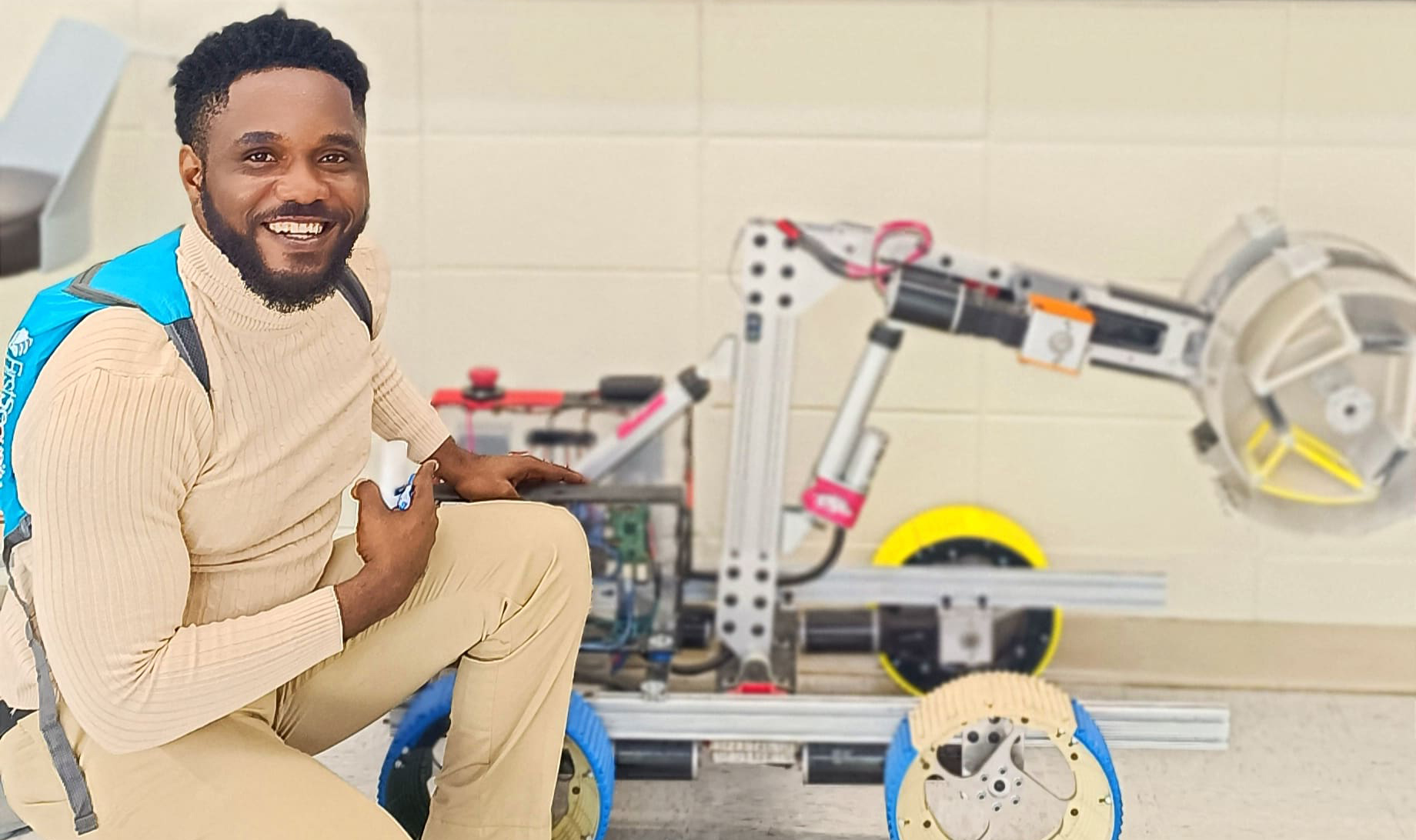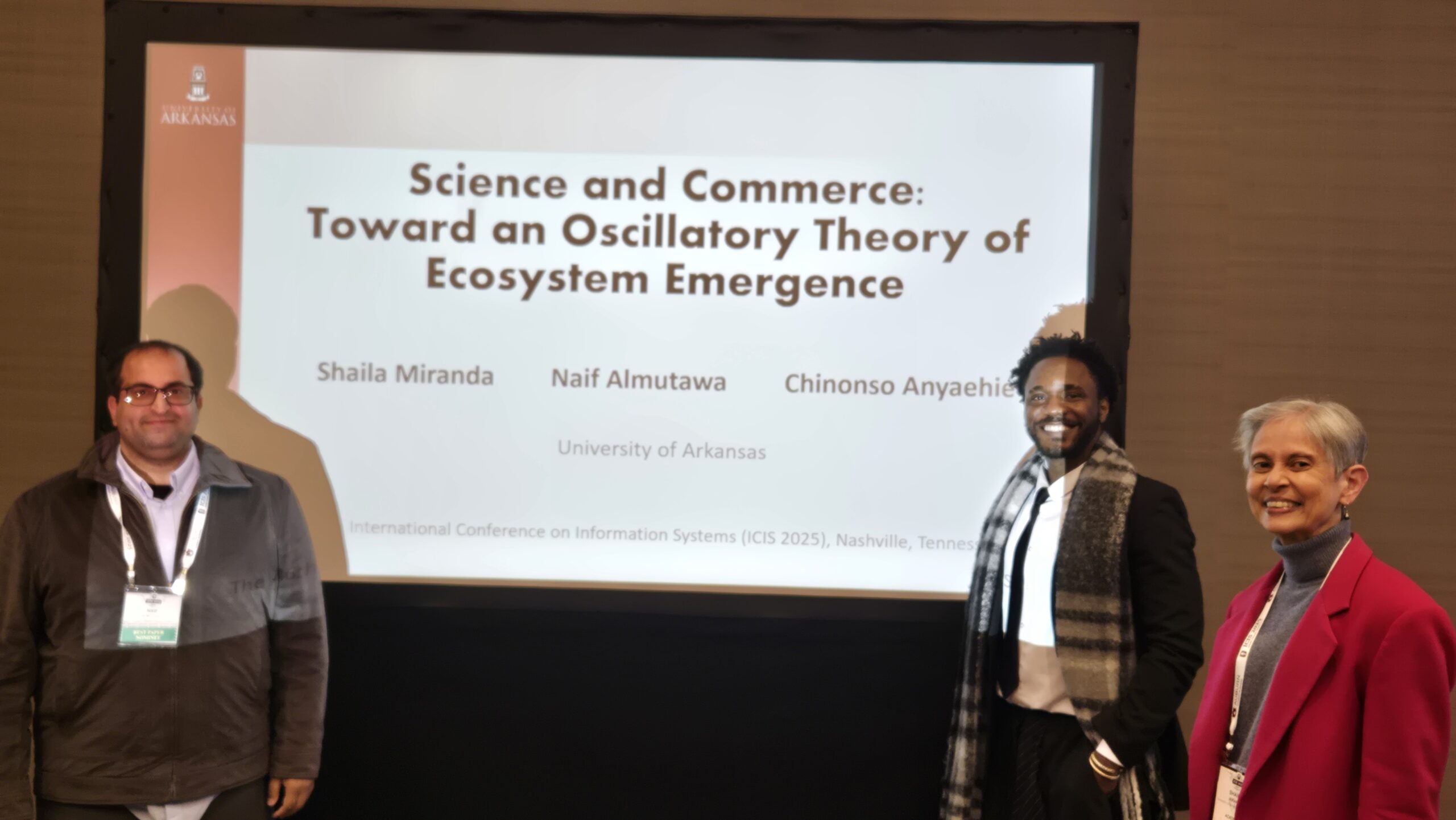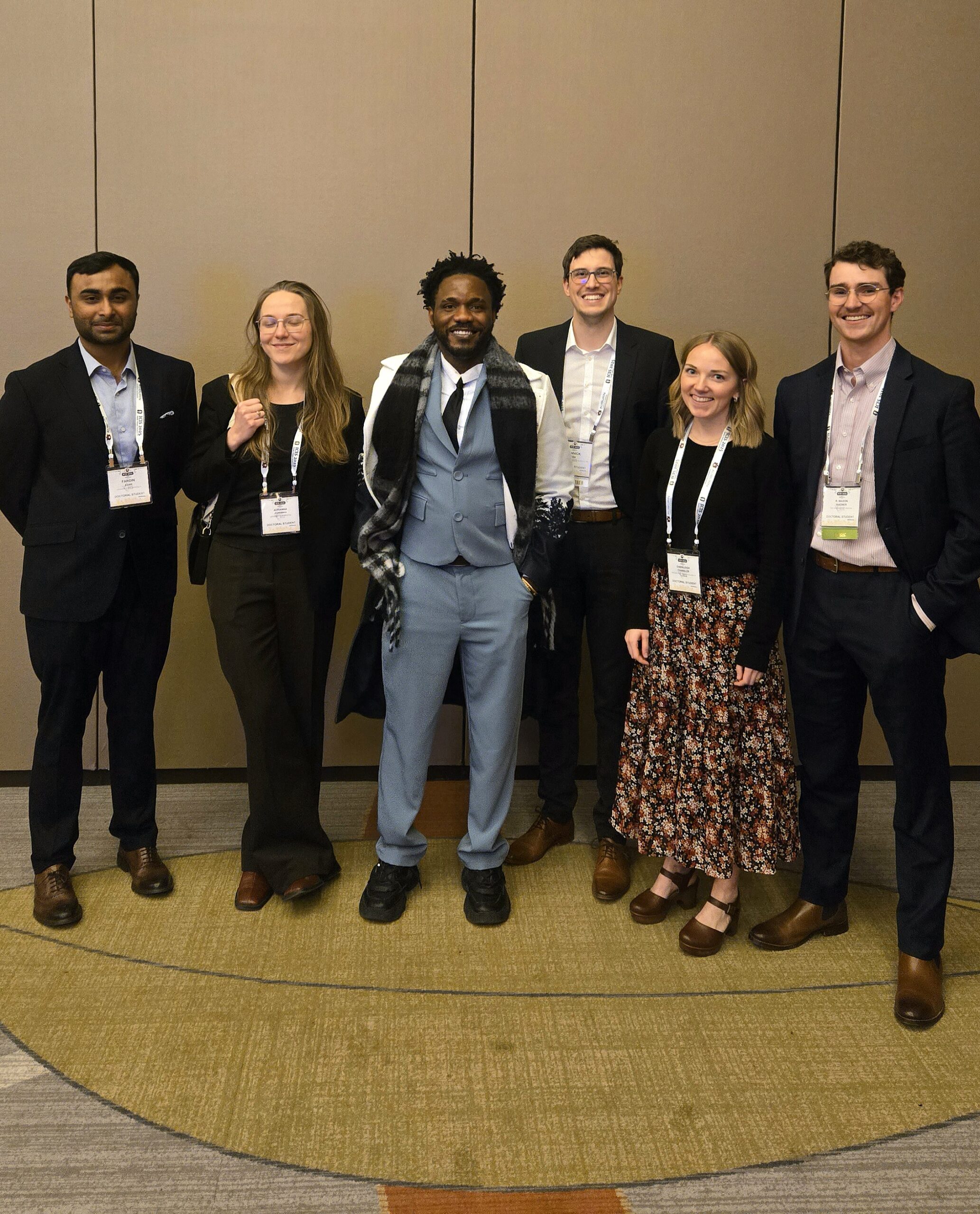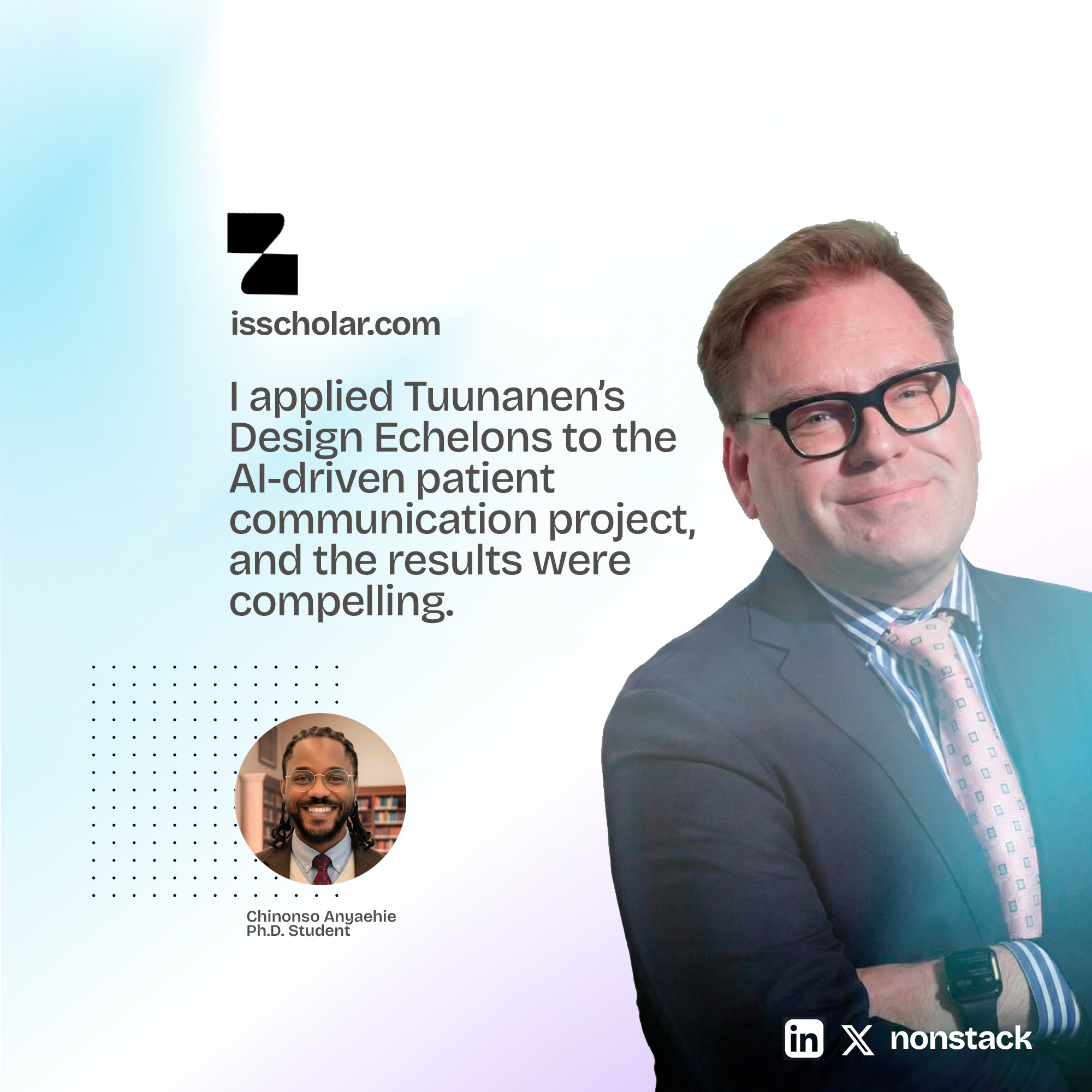I’m currently four months into my PhD journey, and something within me tells me that if I truly want to excel in this program, I need to seek external mentorship and study beyond what is taught in class. I learned very early that a PhD is a personal journey, and you have to seek answers for yourself. As a first-year student, I had zero network or connections apart from my departmental lecturers. One thing I have always known for sure is that to succeed in anything, you need a strong network.
When the opportunity presented itself and I was invited to attend the tenure-track hiring presentations in my department, I knew it was time to connect with some external scholars. I didn’t hesitate to take pictures with some of them. Interestingly, many of them gave compelling presentations. I got their contact details and emailed them afterward. Two out of the three scholars responded positively. One of them, Professor Aron Lindberg, recommended a book by Dr. Viswanath Venkatesh. In his words:
*”It was great to meet you and hear your enthusiasm for research and studies! When I was a PhD student, I found the following book helpful: ‘Road to Success: A Guide for Doctoral Students and Junior Faculty Members in the Behavioral & Social Sciences.’”
If there’s one thing I learned from reading the first chapter, it’s that as a professor, you need to be known for something. Being too broad and spreading yourself too thin is a recipe for failure. Getting a PhD is not just about entering the job market after finishing your program. It’s not about jumping into any possible research stream just to gain citations and meet the requirements for tenure. It’s not about following the latest trends in emerging technology.
I think the most challenging decision you can make is choosing your research focus. Most times, if you make the wrong decision, you’ll likely get bored along the way and pivot to something else, leading to confusion. Getting a PhD should prepare you to become an expert in a field of study that addresses a practical problem. For a field like Information Systems, it’s better to solve a problem that can be applied in practice.
In Dr. Viswanath Venkatesh’s book, the first step is to pursue a single research topic area. You need to understand that a research stream involves work within a specific topic area. The word “stream” is used deliberately to emphasize the idea of an ongoing, cohesive focus.
At first, I asked myself, “Why not just copy Dr. Viswanath Venkatesh’s formula and follow his research trajectory?” The answer is simple: research is no walk in the park. If you’re going to put in that much effort over the years, it’s best to work on something you’re truly passionate about. You don’t want to invest ten years of your life in a research area only to realize you feel compelled, rather than motivated, to work on it. Your research should inspire you.
Ask yourself: how do you want people to introduce you at a conference? What is the one thing you want to be known for? Don’t chase shiny objects just because they are new and trendy.
To answer this question for myself, I had to do a lot of soul-searching. It all boils down to experience. If you have prior industry experience before your PhD, it can go a long way. I think prior experience is hugely underestimated. Before my PhD, I spent 16 years in branding and marketing, and this has helped me approach my PhD as a brand. I’ve applied all the principles of brand building to my PhD journey. This is evident in the fact that I bought a premium domain, designed a logo, and built a website for my academic path.
Broad Research Topic
Technology adoption in organizations.
Overarching Research Question
What are the impacts of technology adoption in organizations?
Now, you can break this overarching question into smaller, specific sub-questions, such as:
Sub-Questions
- Drivers of Adoption: What factors influence employees’ decisions to adopt new technology?
- Enhancing Adoption: How can organizations encourage employees to adopt and effectively use new technologies?
- Outcomes of Adoption: How does technology adoption affect employees’ job performance and satisfaction?
- Broader Impacts: What are the long-term organizational outcomes of widespread technology adoption?
How They Work Together
The overarching question gives you a big-picture focus for your research.
The specific sub-questions act as smaller building blocks to help you investigate various aspects of that big question. Each study or project you conduct might address one or more of these sub-questions, but they all tie back to your overarching question.
Having spent over a decade in the consumer packaged goods (CPG) industry, I can’t just discard that experience. Instead, I’ve decided to use it as a competitive advantage in my research journey. By bringing an Information Systems lens to my experience, I developed a research topic area, overarching research question, sub-themes, and specific questions:
Research Topic Idea
Leveraging Information Systems to Build Resilient, Sustainable, and Consumer-Centric Operations in the CPG Industry.
Overarching Research Question
How can information systems enable consumer packaged goods companies to build resilience, enhance sustainability, and deliver personalized consumer experiences in an increasingly dynamic digital marketplace?
Sub-Themes and Specific Questions
- Building Operational Resilience
- What role do information systems play in enhancing supply chain agility during disruptions (e.g., pandemics, geopolitical issues)?
- How can CPG firms use predictive analytics to anticipate and mitigate operational risks?
- What are the key enablers and barriers to implementing real-time monitoring systems in global CPG supply chains?
- Driving Sustainability Initiatives
- How can CPG companies use IS to track and reduce carbon emissions across their supply chain?
- What role do blockchain and IoT technologies play in improving sustainability transparency for consumers and stakeholders?
- How do digital tools enable circular economy models, such as recycling and waste reduction, in CPG companies?
- Enhancing Consumer-Centric Strategies
- How can CPG firms use AI-driven chatbots and recommendation systems to create personalized consumer experiences?
- What are the effects of augmented reality (AR) applications on consumer decision-making in e-commerce?
- How do consumer data platforms (CDPs) support deeper engagement and loyalty in the CPG sector?
- Innovating Product Development and Marketing
- How can IS-driven crowdsourcing platforms support innovation in product design and development?
- What impact do AI-driven trend analysis tools have on predicting consumer needs and launching successful products?
- How does automation in marketing campaigns influence conversion rates and brand trust in the CPG industry?
- Navigating Data Privacy and Ethical Use
- What are the trade-offs between personalized marketing and consumer data privacy in CPG companies?
- How can information systems ensure compliance with privacy laws like GDPR while still enabling targeted marketing?
- What ethical frameworks should guide the use of consumer data for business insights in the CPG sector?
- Leveraging Digital Ecosystems for Competitive Advantage
- What role do digital ecosystems (e.g., partnerships with platforms like Amazon) play in shaping IS strategies in the CPG sector?
- How can omnichannel integration supported by IS boost consumer loyalty and streamline operations?
- What innovative uses of IS allow CPG companies to outpace competitors in digital marketplaces?
Why This Idea Works
- Integrated Perspective: Combines key themes like resilience, sustainability, consumer engagement, and innovation under one cohesive framework.
- Timely and Relevant: Addresses emerging challenges and opportunities (e.g., disruptions, ethical AI, sustainability) that are top-of-mind for the CPG sector.
- Actionable Insights: Each sub-question can lead to actionable findings for practitioners while contributing to academic theory development.
- Future-Proof: Explores forward-looking applications of IS (e.g., AR, blockchain, digital ecosystems), ensuring relevance in a rapidly evolving industry.
This idea focuses on creating a dynamic, impactful research agenda that resonates with both academic audiences and industry practitioners. I want to buttress this point—you are not doing a PhD to impress your professor or make good grades—the only reason you should be doing a PhD is because you are passionate about getting the required skill sets and need to pursue a research topic you love. You are doing this for yourself—the motivation should be intrinsic, not external. If you feel you are doing a PhD for any other reason than this, then you have lost the mark. A PhD should never feel like a burden to you—I know that sometimes it can be challenging, but it shouldn’t deter you from enjoying the process. Again, one of the reasons why you should answer these questions very early in your journey is because it will serve as a compass to everything you do in your PhD journey, from your summer paper to your dissertation topic. I know I’m not qualified to talk about older students yet because I’m still very much at the beginning of my journey, but some students tend to jump in from nowhere and choose a very fancy emerging tech topic to work on just because of the hype and their novelty or popularity at a given moment but might not have substantial academic or practical depth. These topics often attract students because they seem exciting or cutting-edge, but without a solid research foundation or personal interest, they can lead to challenges in maintaining focus or producing meaningful contributions.
Examples of Trending Topics in Emerging Tech
- Metaverse Applications:Researching how the metaverse will transform every industry without a clear focus or understanding of practical use cases.E.g., “The Impact of the Metaverse on Global Business Operations”—broad and vague.
- Blockchain for Everything:Proposing blockchain for areas where it may not be practical or necessary just because blockchain is trendy.E.g., “Blockchain in Education: Revolutionizing Learning Systems”—without clear implementation details or reasoning.
- Generative AI:Picking a general topic like “How ChatGPT Will Replace Jobs” without grounding the research in a specific context or rigorous methodology.
- Quantum Computing:Choosing topics like “Quantum Computing Will Solve All Security Challenges” without understanding the technological maturity or realistic timeframes.
- Web3 and Decentralization:Broad, idealistic ideas such as “How Web3 Will Democratize the Internet” that lack specificity or measurable outcomes.
- NFTs in Random Areas:Proposing topics like “NFTs for Healthcare Data Management” without considering feasibility, regulation, or ethical concerns.
- AI and Ethics:Jumping into a hot issue like “AI Ethics in Autonomous Vehicles” because it’s popular, without a solid theoretical framework or methodology.
- 5G and IoT:E.g., “5G and IoT: The Future of Everything Connected”—buzzword-heavy without a clear research question or problem.
- Cybersecurity Buzzwords:Topics like “Zero-Trust Architecture Will End Cyber Threats” without fully understanding the complexities and limitations.
- Digital Currencies:Exploring “The Future of Bitcoin as a Global Currency” without grounding in economic or regulatory realities.
Not publishing your dissertation work is like throwing away years of effort. Your dissertation represents a huge time investment and could be the starting point for a long, productive research career. If you abandon it, you risk losing momentum in that area and might even lose interest in the topic entirely.
While it’s okay to pursue other interests, it’s important to recognize the value of what you’re giving up. Publishing in top-tier journals is tough because the acceptance rates are very low (around 10%), and it takes time to get through the process. If you give up on a paper too soon because of a rejection, you’re missing the opportunity to refine and resubmit it, which is a common part of the academic process.
Abandoning your dissertation research entirely is even worse because it wastes the time and energy you invested in building expertise in that area. Instead of giving up, it’s better to stick with the process, even if it takes persistence and effort.
Building the right foundation matters before even getting into any serious work in your PhD journey so you don’t try to retrofit ideas into a theme, which can leave your work feeling forced and less impactful.
This reminds me of a cooking competition I once entered in high school. The challenge was to prepare a dish using “bananas.” Unfortunately, I hadn’t practiced any banana recipes. But I had perfected a recipe for a classic apple pie—flaky crust, caramelized filling, the works. So, I improvised. I swapped the apples for bananas, layered them into the crust, and hoped for the best. When it came time to present, I enthusiastically declared, “This dish showcases how bananas can replace apples!”
While my pie wasn’t a disaster, it was far from great. The judges were polite, but it was clear they didn’t buy my last-minute substitution.
While it might seem tempting to mold any study to fit a broad research question, I recommend taking the opposite approach: carefully define specific, meaningful questions early on and build your work around them.
What does pursuing specific research questions mean? It’s not just about trying to answer them directly but also about investing time in understanding the relevant literature and tracking developments across different fields that address those questions.










Leave a Reply